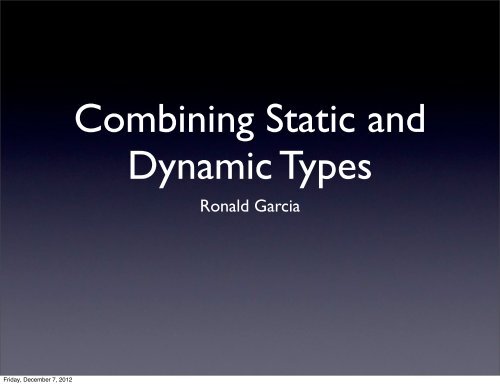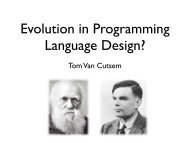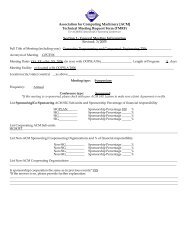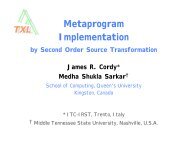Ronald Garcia - Program-Transformation.Org
Ronald Garcia - Program-Transformation.Org
Ronald Garcia - Program-Transformation.Org
Create successful ePaper yourself
Turn your PDF publications into a flip-book with our unique Google optimized e-Paper software.
Combining Static and<br />
Dynamic Types<br />
<strong>Ronald</strong> <strong>Garcia</strong><br />
Friday, December 7, 2012
Gradual Typing<br />
Dynamic Typing:<br />
(Agility)<br />
Static Typing:<br />
(Robustness)<br />
Siek and Taha 2006,2007<br />
2<br />
Friday, December 7, 2012
Gradual Typing<br />
Dynamic Typing:<br />
(Agility)<br />
Static Typing:<br />
(Robustness)<br />
Siek and Taha 2006,2007<br />
3<br />
Friday, December 7, 2012
Gradual Typing<br />
move(x, dx) {<br />
}<br />
return x + dx;<br />
p = 0;<br />
a = 1;<br />
x2 = move(p,a);<br />
Friday, December 7, 2012<br />
4
Gradual Typing<br />
move(int x, dx) {<br />
}<br />
return x + dx;<br />
int p = 0;<br />
a = 1;<br />
x2 = move(p,a);<br />
Friday, December 7, 2012<br />
5
Gradual Typing<br />
int move(int x, dx) {<br />
}<br />
return x + dx;<br />
int p = 0;<br />
a = 1;<br />
int x2 = move(p,a);<br />
Friday, December 7, 2012<br />
6
Gradual Typing<br />
int move(int x, int dx) {<br />
}<br />
return x + dx;<br />
int p = 0;<br />
int a = 1;<br />
int x2 = move(p,a);<br />
Friday, December 7, 2012<br />
7
Gradual Typing<br />
if (SomethingTrue()) {<br />
x = 7.0<br />
} else {<br />
x = “Good Grief!”<br />
}<br />
y = sqrt(x)<br />
8<br />
Friday, December 7, 2012
From GT to Casts<br />
Gradual<br />
Language<br />
Type Check<br />
Cast<br />
Language<br />
Friday, December 7, 2012
Gradual<br />
Language<br />
Type Check<br />
Cast<br />
Language<br />
Friday, December 7, 2012
ound: Cast Calculi<br />
Cast-based Languages<br />
Simply-typed lambda calculus<br />
+ Dyn<br />
Simply-typed lambda calculus<br />
• + type Dyn of dynamic values<br />
+ T ⇐ Se<br />
+ T ⇐ Se<br />
• Expression to cast S values to T values<br />
Γ e : S<br />
Γ e : S<br />
S ∼ T<br />
S ∼ T<br />
Γ T ⇐ Se : T<br />
Γ T ⇐ Se : T<br />
Friday, December 7, 2012
• First-order casts operate on base types.<br />
First-Order Casts<br />
• It is straightforward to check whether a value is<br />
consistent with a base type.<br />
Int ⇐ DynDyn ⇐ Int4 −→ ∗ 4<br />
Bool ⇐ DynDyn ⇐ Int4 −→ ∗ error<br />
Jeremy Siek, <strong>Ronald</strong> <strong>Garcia</strong>, Walid Taha<br />
Higher-Order Casts<br />
Friday, December 7, 2012
f ≡ (λx : Int. if 0 < x then Dyn ⇐ Bool<br />
Higher-Order Casts<br />
Higher-order casts are checked when the function is<br />
applied.<br />
else Dyn ⇐ Int2)<br />
...Int →Int ⇐ Int → Dyn f ...<br />
• Solution: delay checking and perform blame<br />
(Findler and Felleisen 2002, Wadler and Find<br />
& 2009).<br />
f ≡ (λx : Int. if 0 < x then Dyn ⇐ BoolTrue<br />
else Dyn ⇐ Int2)<br />
(λg. g 1) (Int →Int ⇐ Int →Dynf )<br />
−→ (Int →Int ⇐ Int →Dynf ) 1<br />
−→<br />
Int ⇐ Dyn(f Int ⇐ Int1)<br />
−→ Int ⇐ Dyn(f 1)<br />
Jeremy Siek, <strong>Ronald</strong> <strong>Garcia</strong>, Walid Taha<br />
−→ ∗<br />
Higher-Order Casts<br />
Int ⇐ DynDyn ⇐ BoolTrue<br />
Findler and Felleisen, 2002<br />
Friday, December 7, 2012
Design Space of Casts<br />
• Two Axes of Design Space<br />
• How eagerly should we detect errors<br />
• Which expressions deserve attention<br />
• Low-level implementation semantics<br />
Siek, <strong>Garcia</strong>, and Taha, ESOP 2009<br />
Friday, December 7, 2012
How Eagerly<br />
Bool → Int ⇐ Dyn<br />
Dyn ⇐ Int → Int(λx : Int. x)<br />
• Lazy Semantics accept this expression<br />
• Eager Semantics reports a cast error.<br />
Friday, December 7, 2012
Who’s to Blame<br />
(Dyn → Int ⇐ Dyn l 3<br />
Dyn ⇐ Bool → Bool l 2<br />
λx : Bool. x)<br />
Dyn ⇐ Int l 1<br />
1<br />
• UD Strategy blames the context around the<br />
cast with label l2<br />
• D Strategy blames the cast with label l3<br />
Friday, December 7, 2012
Dyn → Int ⇐ Dyn l 3<br />
Dyn ⇐ Bool → Bool l 2<br />
λx : Bool. x−→<br />
Dyn → Int ⇐ Bool → Bool l 3<br />
λx : Bool. x<br />
• D strategy: casts to and from Dyn are<br />
explicitly type-tagged operations<br />
Friday, December 7, 2012
Dyn → Int ⇐ Dyn l 3<br />
Dyn ⇐ Bool → Bool l 2<br />
λx : Bool. x−→<br />
Dyn → Int ⇐ Dyn → Dyn l 3<br />
Dyn → Dyn ⇐ Bool → Bool l 2<br />
λx : Bool. x<br />
• UD strategy: casts to and from Dyn are<br />
encoded as recursive types<br />
Friday, December 7, 2012
Who’s to Blame<br />
Theorem (Blame Safety)<br />
Let e be a well-typed term with subterm T ⇐ S l e <br />
containing the only occurrences of label l in e.<br />
If S
Who’s to Blame<br />
Theorem (Blame Safety)<br />
Let e be a well-typed term with subterm T ⇐ S l e <br />
containing the only occurrences of label l in e.<br />
If S
Design Space<br />
Lazy UD<br />
*<br />
Lazy D<br />
Eager UD<br />
Eager D<br />
* Wadler and Findler 2009<br />
Friday, December 7, 2012
Recent Developments<br />
• High-Level Semantics for Casts*<br />
• D semantics subsume UD semantics.<br />
• Eager D and UD semantics are subtle.<br />
• Implementation Strategy<br />
• Threesomes for the full design space<br />
*Joint work with Jeremy Siek<br />
Friday, December 7, 2012
Desirable Properties<br />
• Reasonable Performance<br />
• Error Detection<br />
• Error Reporting<br />
• Full Language<br />
Friday, December 7, 2012
JOURNAL OF COMPUTER AND SYSTEM SCIENCES 17, 348-375 (1978)<br />
A Theory of Type Polymorphism in <strong>Program</strong>ming<br />
ROBIN<br />
MILNER<br />
Computer Science Department, Vm+ersity of Edinburgh, Edinburgh, Scotland<br />
Received October 10, 1977; revised April 19, 1978<br />
The aim of this work is largely a practical one. A widely employed style of programming,<br />
particularly in structure-processing languages which impose no discipline of types,<br />
entails defining procedures which work well on objects of a wide variety. We present a<br />
formal type discipline for such polymorphic procedures in the context of a simple programming<br />
language, and a compile time type-checking algorithm w which enforces the<br />
discipline. A Semantic Soundness Theorem (based on a formal semantics for the language)<br />
states that well-type programs cannot “go wrong” and a Syntactic Soundness Theorem<br />
states that if fl accepts a program then it is well typed. We also discuss extending these<br />
Friday, December 7, 2012
states that well-type programs cannot “go wrong” and a Syntactic Soundness Theorem<br />
states that if fl accepts a program then it is well typed. We also discuss extending these<br />
results to richer languages; a type-checking algorithm based on w is in fact already<br />
implemented and working, for the metalanguage ML in the Edinburgh LCF system,<br />
1. INTRODUCTION<br />
The aim of this work is largely a practical one. A widely employed style of programming,<br />
particularly in structure-processing languages which impose no discipline of types<br />
(LISP is a perfect example), entails defining procedures which work well on objects of<br />
a wide variety (e.g., on lists of atoms, integers, or lists). Such flexibility is almost essential<br />
in this style of programming; unfortunately one often pays a price for it in the time taken<br />
to find rather inscrutable bugs-anyone who mistakenly applies CDR to an atom in<br />
LISP, and finds himself absurdly adding a property list to an integer, will know the<br />
symptoms. On the other hand a type discipline such as that of ALGOL 68 [22] which<br />
precludes the flexibility mentioned above, also precludes the programming style which<br />
we are talking about. ALGOL 60 was more flexible-in that it required procedure<br />
parameters to be specified only as “procedure” (rather than say “integer to realprocedure”)<br />
-but the flexibility was not uniform, and not sufficient.<br />
An early discussion of such flexibility can be found in Strachey [19], who was probably<br />
the first to call it polymorphism. In fact he qualified it as “parametric” polymorphism,<br />
in contrast to what he called “adhoc” polymorphism. An example of the latter is the use<br />
of “+” to denote both integer and real addition (in fact it may be further extended to<br />
denote complex addition, vector addition, etc.); this use of an identifier at several distinct<br />
types is often now called “overloading,” and we are not doncerned with it in this paper.<br />
In this paper then, we present and justify one method of gaining type flexibility, but<br />
Friday, December 7, 2012
states that well-type programs cannot “go wrong” and a Syntactic Soundness Theorem<br />
states that if fl accepts a program then it is well typed. We also discuss extending these<br />
results to richer languages; a type-checking algorithm based on w is in fact already<br />
implemented and working, for the metalanguage ML in the Edinburgh LCF system,<br />
1. INTRODUCTION<br />
The aim of this work is largely a practical one. A widely employed style of programming,<br />
particularly in structure-processing languages which impose no discipline of types<br />
(LISP is a perfect example), entails defining procedures which work well on objects of<br />
a wide variety (e.g., on lists of atoms, integers, or lists). Such flexibility is almost essential<br />
in this style of programming; unfortunately one often pays a price for it in the time taken<br />
to find rather inscrutable bugs-anyone who mistakenly applies CDR to an atom in<br />
LISP, and finds himself absurdly adding a property list to an integer, will know the<br />
symptoms. On the other hand a type discipline such as that of ALGOL 68 [22] which<br />
precludes the flexibility mentioned above, also precludes the programming style which<br />
we are talking about. ALGOL 60 was more flexible-in that it required procedure<br />
parameters to be specified only as “procedure” (rather than say “integer to realprocedure”)<br />
-but the flexibility was not uniform, and not sufficient.<br />
An early discussion of such flexibility can be found in Strachey [19], who was probably<br />
the first to call it polymorphism. In fact he qualified it as “parametric” polymorphism,<br />
in contrast to what he called “adhoc” polymorphism. An example of the latter is the use<br />
of “+” to denote both integer and real addition (in fact it may be further extended to<br />
denote complex addition, vector addition, etc.); this use of an identifier at several distinct<br />
types is often now called “overloading,” and we are not doncerned with it in this paper.<br />
In this paper then, we present and justify one method of gaining type flexibility, but<br />
Friday, December 7, 2012
states that well-type programs cannot “go wrong” and a Syntactic Soundness Theorem<br />
states that if fl accepts a program then it is well typed. We also discuss extending these<br />
results to richer languages; a type-checking algorithm based on w is in fact already<br />
implemented and working, for the metalanguage ML in the Edinburgh LCF system,<br />
1. INTRODUCTION<br />
The aim of this work is largely a practical one. A widely employed style of programming,<br />
particularly in structure-processing languages which impose no discipline of types<br />
(LISP is a perfect example), entails defining procedures which work well on objects of<br />
a wide variety (e.g., on lists of atoms, integers, or lists). Such flexibility is almost essential<br />
in this style of programming; unfortunately one often pays a price for it in the time taken<br />
to find rather inscrutable bugs-anyone who mistakenly applies CDR to an atom in<br />
LISP, and finds himself absurdly adding a property list to an integer, will know the<br />
symptoms. On the other hand a type discipline such as that of ALGOL 68 [22] which<br />
precludes the flexibility mentioned above, also precludes the programming style which<br />
we are talking about. ALGOL 60 was more flexible-in that it required procedure<br />
parameters to be specified only as “procedure” (rather than say “integer to realprocedure”)<br />
-but the flexibility was not uniform, and not sufficient.<br />
An early discussion of such flexibility can be found in Strachey [19], who was probably<br />
the first to call it polymorphism. In fact he qualified it as “parametric” polymorphism,<br />
in contrast to what he called “adhoc” polymorphism. An example of the latter is the use<br />
of “+” to denote both integer and real addition (in fact it may be further extended to<br />
denote complex addition, vector addition, etc.); this use of an identifier at several distinct<br />
types is often now called “overloading,” and we are not doncerned with it in this paper.<br />
In this paper then, we present and justify one method of gaining type flexibility, but<br />
Friday, December 7, 2012
Dynamic Typing:<br />
(Agility)<br />
Static Typing:<br />
(Robustness)<br />
Friday, December 7, 2012
Dynamic Typing:<br />
(Agility)<br />
Static Typing:<br />
(Robustness)<br />
✓<br />
<br />
Friday, December 7, 2012





